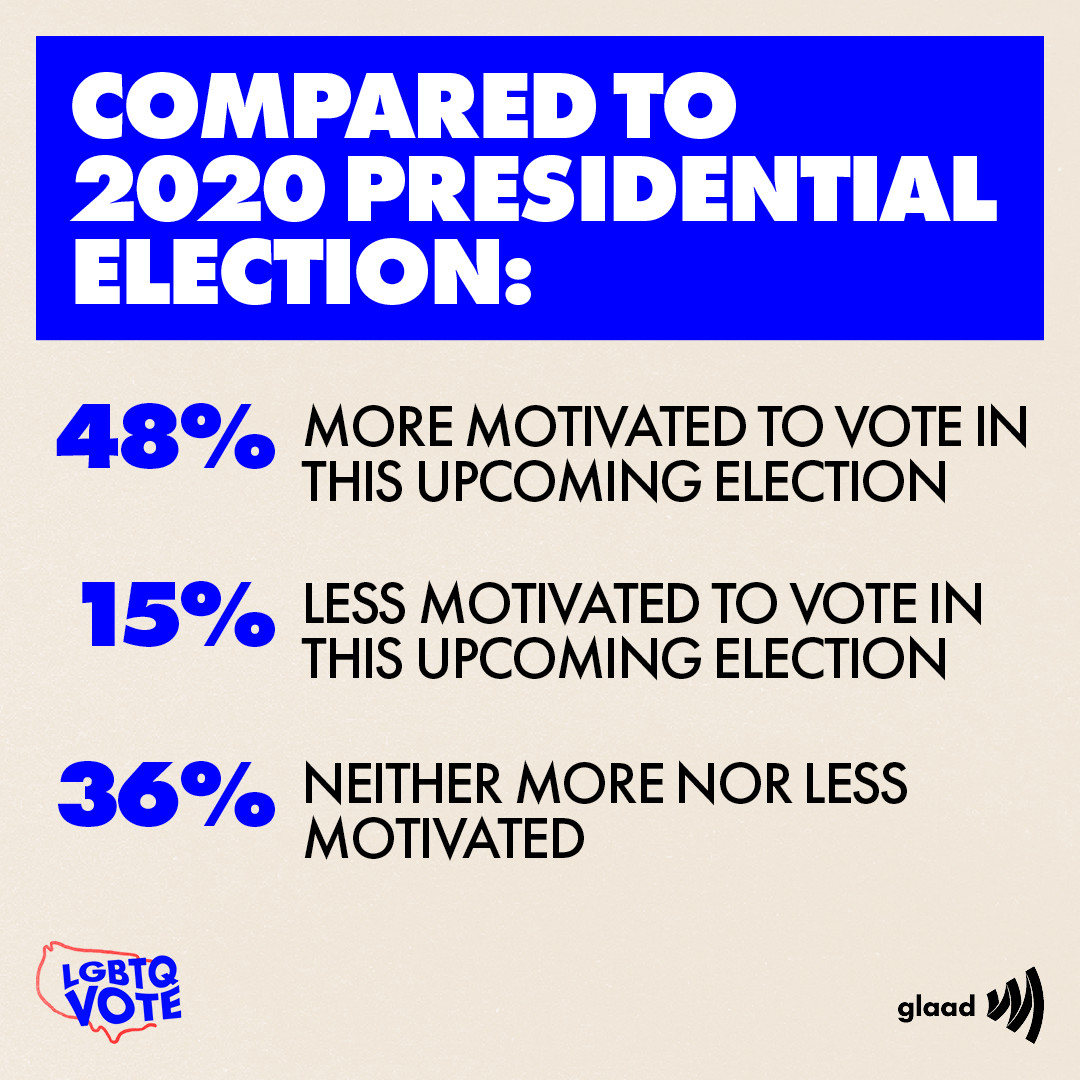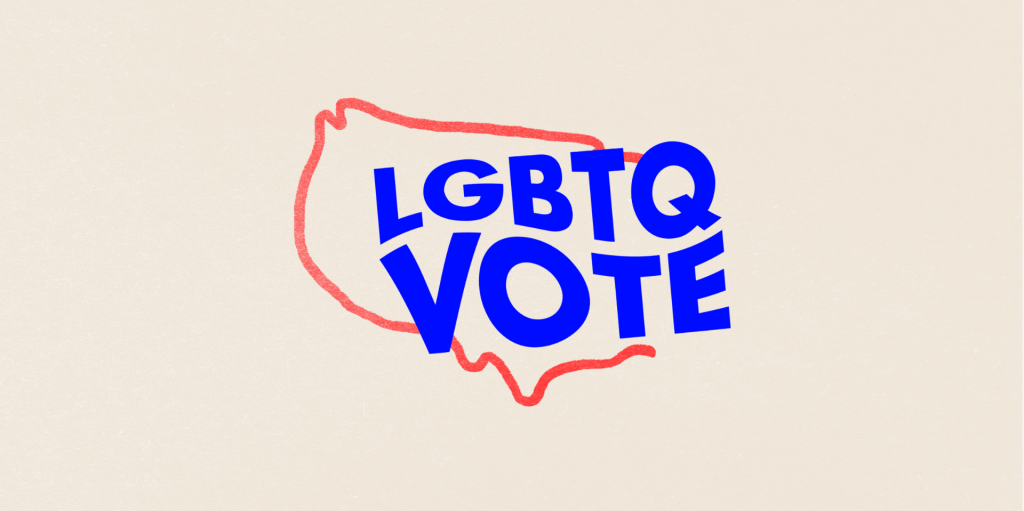GLAAD, the world’s largest LGBTQ media advocacy organization, is releasing the findings of the first of an ongoing series of polls that gauge and track motivation, enthusiasm, and issues leading up to the 2022 midterm elections in November.
The poll measures how motivated LGBTQ likely voters are to vote in the midterms as compared with motivation for the 2020 Presidential election. Participants were also asked about their preferred candidates on a generic ballot for the U.S. Congress, about the COVID-19 pandemic, and which issues were their highest priorities to see discussed on the campaign trail.
LGBTQ voters provided the deciding edge for the pro-equality presidential ticket in 2020. This year, elections are underscored by an increasingly hostile climate toward LGBTQ people in state legislatures across the country. Nearly 160 bills have been proposed in 2022, most (91) targeting transgender people and youth, and there’s been a surge of anti-LGBTQ school policy bills (60) banning classroom conversation and books about LGBTQ people under the guise of “parents’ rights,” like Florida’s “Don’t Say Gay” bill. South Dakota Gov. Kristi Noem signed a bill on February 3, 2022, banning transgender girls and women from playing on female sports teams, one of nearly 40 proposed school sports bans. At least 26 bills target trans youth private healthcare, against recommendations from every major medical association about its safety and lifesaving effectiveness.
The poll was conducted by Pathfinder Opinion Research from January 23–29, 2022, and surveyed 1,000 LGBTQ adults in the United States. Read more about the poll here.
“GLAAD’s snapshot poll shows what LGBTQ voters have endured in the COVID-19 crisis, and they revealed their top priorities for the midterm elections including jobs, climate, racial justice, and healthcare,” said GLAAD President and CEO Sarah Kate Ellis. The LGBTQ community’s issues are deeply connected to the greater struggles for equality and equity across American society. We are a part of every family, community and neighborhood. LGBTQ people and our allies must unite as a powerful voting bloc for positive change and to act as a bulwark against those who oppose our rights. LGBTQ voters were critical to the victories of pro-equality candidates up and down the ballot in 2020. We must continue to ensure LGBTQ voices and voters are heard in 2022.”
 The poll found that 83% will definitely or probably vote in the 2022 midterms. 50% are extremely motivated to vote in 2022 (driven by younger voters 18–24 at 65%) with 48% more motivated to vote in the midterms as compared with the 2020 Presidential election.
The poll found that 83% will definitely or probably vote in the 2022 midterms. 50% are extremely motivated to vote in 2022 (driven by younger voters 18–24 at 65%) with 48% more motivated to vote in the midterms as compared with the 2020 Presidential election.
 COVID-19 remains top of the issues more important to LGBTQ Americans, particularly among younger demographics: 32% of all polled selected it as one of the most important issues that candidates for office must address in 2022, followed by jobs and the economy (28%), healthcare (25%), the environment (23%), inflation (19%), racial justice (18%), voting rights (15%), and LGBTQ equality (11%). Polled could select up to two most important issues.
COVID-19 remains top of the issues more important to LGBTQ Americans, particularly among younger demographics: 32% of all polled selected it as one of the most important issues that candidates for office must address in 2022, followed by jobs and the economy (28%), healthcare (25%), the environment (23%), inflation (19%), racial justice (18%), voting rights (15%), and LGBTQ equality (11%). Polled could select up to two most important issues.
Attitudes toward President Biden’s Build Back Better plan show a significant margin of favor (73%) over oppose (27%). Half of the participants (50%) would be more motivated to vote in the midterms if President Biden nominated a progressive, pro-LGBTQ justice to the Supreme Court, and 6% would be less motivated.
 In a choice of generic candidates for the U.S. Congress if the vote happened today, 77% would select the Democratic candidate, 15% would choose the Republican candidate, and 4% would choose someone else.
In a choice of generic candidates for the U.S. Congress if the vote happened today, 77% would select the Democratic candidate, 15% would choose the Republican candidate, and 4% would choose someone else.
The poll revealed some key attitudes about COVID-19 with 46% feeling the worst of the pandemic is behind us, and 54% saying that the worst is yet to come. 74% are fully vaccinated, 46% experienced increased mental health issues due to COVID-19 (particularly among 18–24 year olds at 64%), 27% increased their personal debt to make ends meet, 23% tested positive for COVID, and 23% reported they had a close friend or family member die due to COVID-19.
The LGBTQ vote is growing in significance as the percentage of U.S. adults who self-identify as lesbian, gay, bisexual, transgender or something other than heterosexual has reached a new high of 7.1%, according to a 2021 Gallup poll published in February. The figure is higher than the 5.6% who self-identified as LGBTQ in 2020, and it’s double the percentage from 2012, when Gallup first measured it (3.5%).
According to the Williams Institute, in 2020 nine million LGBTQ adults were registered to vote, but 21% of LGBTQ adults were not registered to vote.
METHODOLOGY: GLAAD’s Voter Pulse Poll
These findings represent the results of a survey conducted by Pathfinder Opinion Research from January 23–29, 2022, among n=1,000 LGBTQ adults in the United States. Interviews were conducted online utilizing a national research panel. Respondents were selected to represent the national LGBT population based on demographic estimates of this universe published by the Williams Institute and weighted by gender, age, race, education, and geographic region based on Williams Institute data. Within this sample of LGBTQ adults are subsets of registered voters (n=837) and likely voters (n=698). For this survey, the overall credibility interval (a theoretical margin of error for non-probability samples) is ±3.1%.













